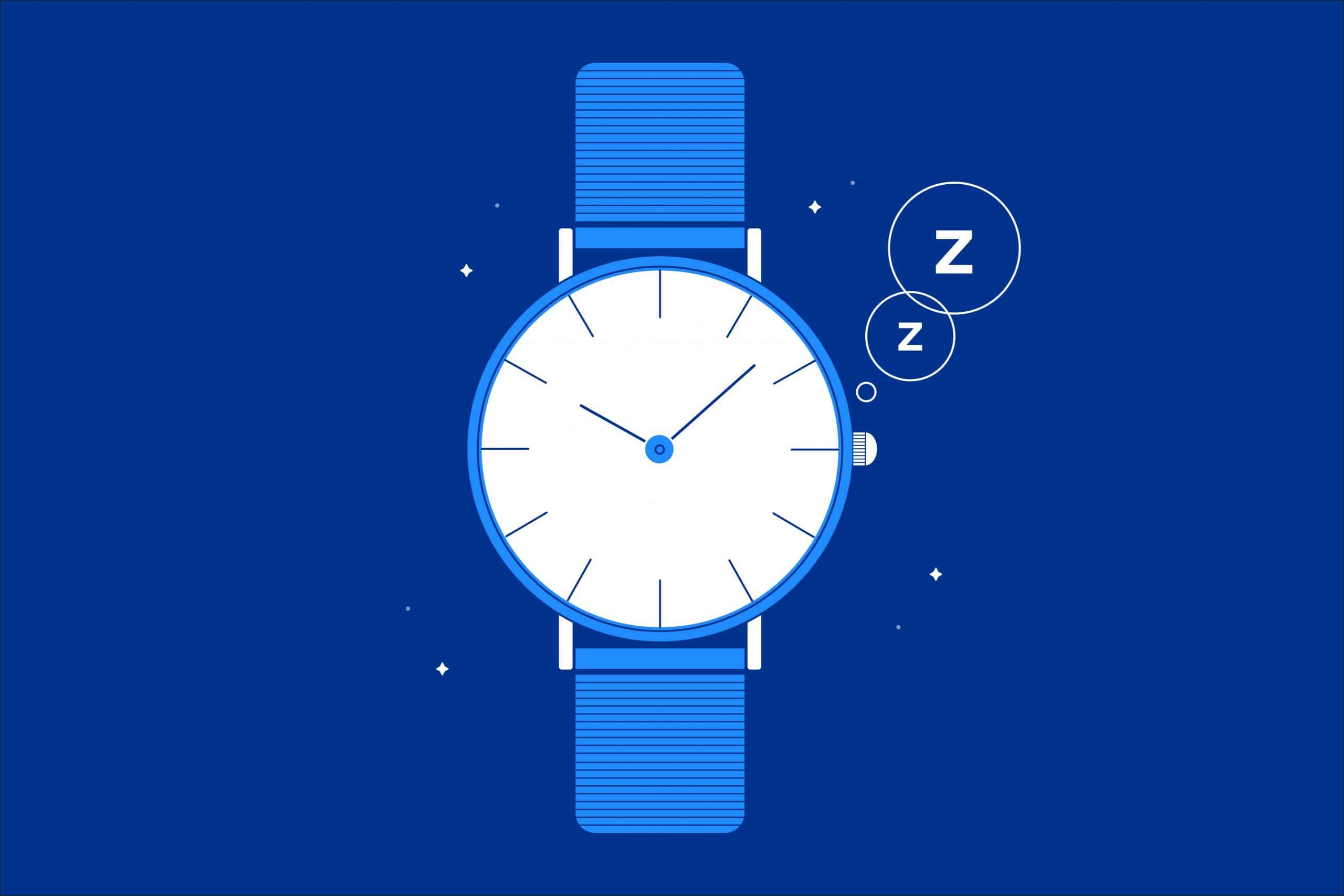Key Takeaways
- Sleep Needs Vary by Age and Individual: Sleep requirements are not one-size-fits-all. They change with age, with babies, children, teenagers, adults, and seniors all needing different amounts of sleep. Individual factors, such as lifestyle, health conditions, and genetics, can influence how much sleep a person needs.
- Health Impacts of Sleep: Sleep is essential for overall health and well-being. It plays a crucial role in immune function, hormone regulation, memory consolidation, and physical recovery. Chronic sleep deprivation can lead to mood disturbances, impaired cognitive function, increased risk of chronic diseases, and even weight gain.
- Quality Matters as Much as Quantity: While the recommended hours of sleep are important, the quality of sleep is equally vital. Factors such as maintaining a regular sleep schedule, avoiding blue light before bedtime, limiting caffeine intake, and having a comfortable mattress can all contribute to better sleep quality.
Determining the amount of sleep you need should come down to gauging how rested you feel in the mornings, right? Not quite.
Sleep needs are complex; they change with age and can differ depending on your lifestyle and socio-cultural norms. While sleep calculators are a helpful tool in developing a healthy sleep schedule, it’s also important to know what factors should be considered when deciding how much sleep you need each night.
To write this article, we reached out to several sleep specialists for their insight on getting enough sleep from night to night, check out their advice below.
Recommended Hours of Sleep by Age
As you get older, your sleep needs change. Dr. Jared Heathman, a family psychiatrist, says, “ Studies Verified Source National Library of Medicine (NIH) World’s largest medical library, making biomedical data and information more accessible. View source have shown that sleep requirements are not equivalent for everyone. Different age groups typically require different amounts of sleep.”
As you might imagine, developing bodies need more rest to stay fueled, which is why babies, children, and teenagers require more sleep than adults. However, you never “grow out” of needing sleep (even if you feel you can function just fine with too little or without it), and adults still need to clock 7 to 9 hours of sleep every night to feel their best.
Dr. Heathman also adds, “There is some variability even at the individual level. When you are fighting an infection or seasonal allergies, your body is working overtime. The body, therefore, will need more sleep to feel well-rested and help you recover from an illness.”
Every year, the CDC updates its sleep recommendations. Below, we break these down by age group Verified Source Centers for Disease Control and Prevention (CDC) The United States’ health protection agency that defends against dangers to health and safety. View source :
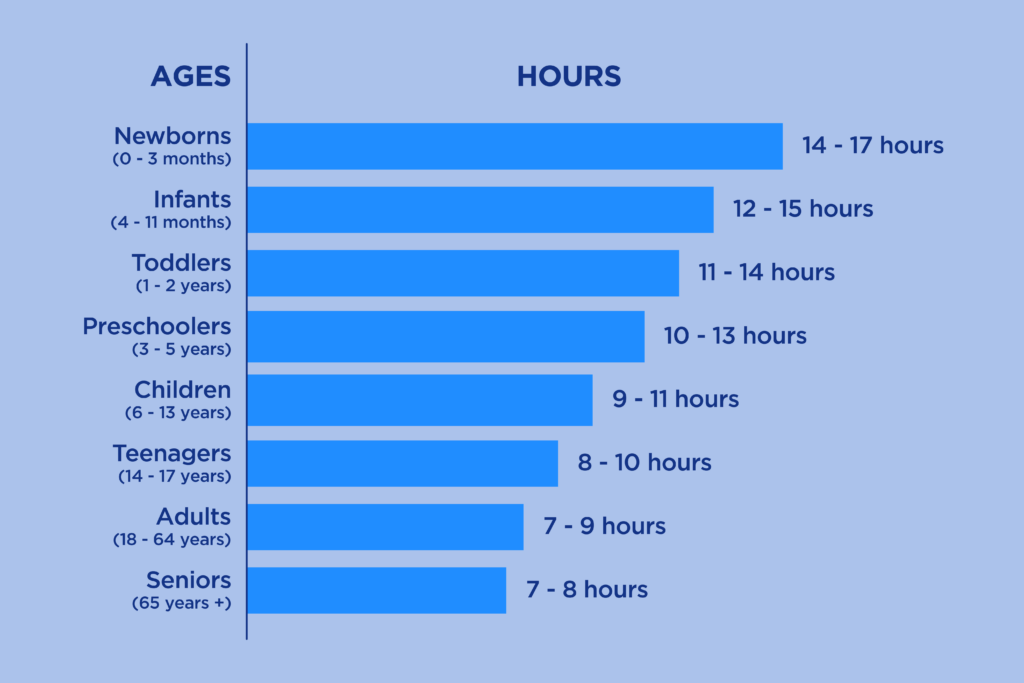
- Newborns (0-3 months): 14-17 hours
- Infants (4-11 months): 12-15 hours
- Toddlers (1-2 years): 11-14 hours
- Preschoolers (3-5): 10-13 hours
- Children (6-13): 9-11 hours
- Teenagers (14-17): 8-10 hours
- Adults (18-64): 7-9 hours
- Seniors (65+): 7-8 hours
You’ll notice seniors (older adults ages 65 and over) only need 7 to 8 hours of sleep, in comparison to 7 to 9 for adults—this is because your circadian rhythm shifts as you age.
It is commonly agreed that 7 hours of sleep Verified Source National Library of Medicine (NIH) World’s largest medical library, making biomedical data and information more accessible. View source is the minimum amount that adults need. Sleep needs change with age, so how much sleep you need in your 70s is typically different from what you need in your 20s. Many seniors have advanced sleep phase syndrome; this essentially means older people get tired earlier in the evening and wake up earlier in the morning.
The shift in seniors’ circadian rhythm also causes them to spend less time in deeper stages of sleep, so they cycle through all four sleep stages faster than younger adults. As a result, seniors need to rest for 7 or 8 hours to complete five sleep cycles.
There are many different factors impacting how much sleep a person needs. While the general guidelines above are good to follow, you should also take your lifestyle and health conditions into consideration when developing a healthy sleep schedule.
Other Sleep Time Recommendations
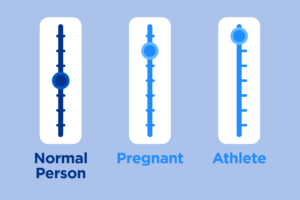 Pregnant women, athletes, and people with physically-demanding jobs all require a little more sleep than what the general guidelines recommend. The more your body works, the more time it needs to recuperate—and cutting your body short of much-needed recovery time can lead to fatigue, amongst other unpleasant side effects.
Pregnant women, athletes, and people with physically-demanding jobs all require a little more sleep than what the general guidelines recommend. The more your body works, the more time it needs to recuperate—and cutting your body short of much-needed recovery time can lead to fatigue, amongst other unpleasant side effects.
These groups may need to sleep more than the average adult does and take steps to ensure they’re acheiving their highest possible quality of sleep.
Other conditions, such as hypersomnia, depression, narcolepsy, and even brain injuries, can all cause you to sleep for more than 9 hours a night. If you’re consistently clocking over 9 hours of sleep per night, talk to your doctor about your sleeping habits.
In some cases, more sleep is necessary for your body; but in others, patients find they’re oversleeping. In those cases, your doctor can work with you to determine how much sleep you truly need and develop a game plan for fixing your sleep schedule.
Genetics also play a role in how much sleep you need. It might sound too simple, but your body may just be wired to require more (or less) sleep. Dr. Nikola Djordjevic, MD, comments, “The daily need for sleep depends on multiple factors, including genetics. Interestingly, recent research points out that some people have a genetic predisposition to perform better with less time spent on sleeping.”
A 2017 study done on fruit flies indicates certain genetic factors impact sleep duration, resulting in very long (or very short) sleep times.
However, we should mention it’s very rare that somebody requires less sleep. There are many of us who believe we can perform fine with less than 6 hours of sleep, and this is because we’re unaware of our own impairment.
Sure, we may know we need more sleep because we feel tired or irritable, but there are a lot of symptoms of sleep deprivation we don’t immediately pick up on. For example, poor decision-making skills and impaired reaction times from sleep deprivation.
Just as studies have been done to understand why some people need more sleep, other studies Verified Source Wiley Multinational publishing company specializing in academic and instructional materials. View source have been conducted to determine if certain populations can truly perform their best with less sleep.
“The average adult needs about 7 to 8 hours of sleep. However, a very small percent (less than 1% need less than 6 hours of sleep) and a small percent need greater than 8 hours of sleep,” says Amy Korn-Reavis, a Clinical Sleep Educator. “What is more important is how much sleep children and teens need due to their greater growth and learning. Teens need 8 to 10 hours per night and can have issues with delayed sleep onset. Children need between 9 and 12 hours of sleep. Preschoolers need 10 to 13 hours and toddlers need 11 to 14 including an afternoon nap.”
When developing a sleep schedule, we suggest sticking to the CDC’s recommendations and making modifications only if you feel you need more rest each night.
Why Is Sleep Important?
Good sleep is the foundation for a healthy life. Health and wellness coach Shawna Robins adds, “Sleep is a very active time for your body to repair itself.” She also says, “A healthy adult needs 7 to 9 uninterrupted hours of sleep every night. This amount allows your body to properly make new immune cells (called CD8 cells), gives your brain the time it needs to regenerate and repair itself, and lowers your blood pressure. Five REM cycles is the healthy amount needed for your body to trigger its rest and repair mode. And this typically takes an adult 7 to 9 uninterrupted hours.”
You can follow the healthiest diet and stick to the strictest training regimen, but if you never get good sleep, you’ll never feel your absolute best. Our brains and bodies need time to recover after each day—when we don’t give our bodies enough time to refresh, we short-change our performance for the day ahead.
According to Dr. Lisa Ballehr, “As adults, people don’t put enough emphasis on their own sleep or even view it as an important element of health and well-being. At any age, sleep is one of the most crucial health elements that many people are deprived of—often unknowingly.”
During sleep, your brain cleanses itself of harmful toxins and waste proteins so it can process new information and retain new memories the following day. The elimination of this waste also helps to prevent conditions such as Alzheimer’s, as it keeps the connection between neurons sharp so each part of your brain can function as it should.
“Your mind and body work hard repairing damage that occurred during the day while you sleep. If you find yourself being irritable or clumsy, you may need more sleep,” says Jeanine Joy, Ph.D. “Grief, loss, and fear will increase your need for sleep. Your ability to remember and recall information may also be impaired if you need more sleep.”
When you sleep, your body and sympathetic nervous system can rest. Your sympathetic nervous system controls your fight or flight responses, so when this system is inactive, it gives your heart and blood vessels a chance to relax—this lowers your risk of developing high blood pressure or heart disease, two common health issues associated with poor sleep quality.
Dr. Sarah Mitchell notes, “Considering your sleep amount, one should also consider sleep quality. You’ll notice that when you wake more frequently during the night, you’ll feel less rested on wake up, even though your overall quantity was about the same.”
Dr. Lisa Ballehr also adds, “Those that practice irregular sleep patterns or work night shifts, for example, may struggle with their health simply due to lack of sleep, which can result in chronic inflammation and diseases such as diabetes and premature liver failure. Lack of sleep can also result in lower levels of HDL cholesterol (the kind that protects); higher levels of triglyceride, which has been linked to an increased risk of heart disease; and higher amounts of body fat.”
If you’re an athlete or lead an active lifestyle, you may understand the importance of sleep when building muscle. Adequate sleep allows for tissue repair and muscle recovery, so you can grow stronger faster.
Sleep is also vital for immune function and hormone regulation. When sleeping, your body releases T cells and cytokines—these strengthen your immune system to fight off infection, cancer cells, and inflammation. If you don’t get enough sleep, you’re more susceptible to viruses and illness.
Your body releases a number of different hormones when you sleep, including Human Growth Hormone (HGH)—one of the most important hormones for your development. Sleep also regulates your hormone levels, keeping stress levels low and internal processes regulated.
Impacts of Sleep Deprivation
Sleep deprivation impacts all areas of our life, from our moods to how well we can drive a vehicle. The alarming fact is though, that many adults live their lives sleep deprived, as the CDC estimates nearly one-third of adults get less than 7 hours of sleep each night.
Most noticeably, sleep deprivation impacts our moods. When you deprive yourself of sleep, your body produces more cortisol (a stress hormone) to keep you alert and awake—aside from irritation or moodiness, the dysregulation of cortisol levels mean they will not lower enough to let a person fall asleep. Being tired can also make you cranky and irrational, as it affects our ability to make good decisions and handle stress.
Insufficient sleep can also impact reaction times and hand-eye coordination, two very important things necessary for driving. Getting behind the wheel when you’re tired is more dangerous than you might imagine—every year there are nearly 6,000 fatal crashes due to drowsy driving.
Drifting out of your lane, forgetting the last few exits, and droopy eyelids are all signs you’re too tired to drive. If you’re questioning whether or not you should get behind the wheel, be safe and call a rideshare, instead.
Operating on little sleep also influences your ability to process and retain new information. When you’re tired, you’re forgetful, unmotivated, and essentially “in a fog.” Working on complex tasks or studying a new concept is virtually impossible after a sleepless night since you’re lacking in the brainpower to stay focused and fully remember what you’re learning.
One of the scarier side effects of sleep deprivation is the toll it takes on our immune system. Your immune system needs T cells and cytokines to protect you from infection, and sleep is the time those cells and proteins are produced and released. Without sleep, your immune system suffers.
In a time where many of us are fearful of the coronavirus and its impact, it’s worth mentioning that sleep is now more important than ever, as recent research Verified Source National Library of Medicine (NIH) World’s largest medical library, making biomedical data and information more accessible. View source has found a lack of sleep can increase your risk of respiratory diseases.
“Ultimately prolonged lack of sleep can lead to a higher risk of long-term disease because our body doesn’t have time to fix itself during our downtime,” says sleep therapist, Karen Botha.
In addition to impacting your moods, immune system, and brainpower, poor sleep can also cause you to gain weight. Sleep deprivation throws your hormones out of whack, and this affects more than just your moods—a lack of sleep causes your body to produce more ghrelin (a hunger hormone) and less leptin (an appetite-suppressing hormone), so you’ll feel hungrier, and as a result, eat more. And when you’re sleep-deprived, you’re more likely to opt for sugary, unhealthy snacks and skip workouts.
Over time, these unhealthy habits can lead to weight gain. Professor Dagmara Dimitriou also points out that, “The amount of time you sleep is very important, however uninterrupted, good quality of sleep is equally vital for an optimally healthy lifestyle, behavioral and cognitive functioning.”
Who’s at Risk of Sleep Deprivation?
Shift workers, frequent flyers, and those with busy lifestyles are most at risk of sleep deprivation. Shift workers and frequent flyers can suffer from jet lag, making it difficult to adjust to a new sleep schedule, and those with hectic schedules are more likely to skip on sleep to make time for other things.
If you’re a shift worker or you travel often, there are ways to ease your circadian rhythm troubles. When it comes to shift workers, a strategy is key. Sure, your schedule may change, but you should always have time to plan ahead. If you know you’re working nights and will need to sleep during the day, do your best to avoid bright light (sunlight and blue) after your shift—wear sunglasses when you drive home and install blackout curtains in your bedroom. Avoid greasy foods or big meals, and instead, have a light snack. If you live in a noisy area, try earplugs, too.
Frequent flyers should do their best to accustom themselves to their new schedules a few days in advance. If you’re flying west, start going to bed an hour later in the nights leading up to your trip (and do the opposite if you’re flying east). Once you arrive at your destination, stick to the day’s schedule and don’t go to sleep until it’s bedtime—this can help you adapt to your new time zone quickly and easily.
If you’re somebody who skips out on shut-eye to make time for other tasks, or because you feel there isn’t enough time in the day to get a full 7 to 9 hours of sleep, take a look at your weekly schedule and pinpoint areas where you can make adjustments and re-prioritize.
With so many reasons to love sleep, it should be hard to find excuses to skip it. Even when life gets busy and compromises need to be made, you shouldn’t cut yourself short on sleep. Once you make sleep a priority, you’ll figure out ways to ensure you’re always clocking the necessary 7 to 9 hours a day.
How Can I Tell If I’m Getting Enough Sleep?
One of the easiest ways to determine if you’re getting enough sleep is to think about how you feel in the mornings. If you’re struggling to get out of bed most days, something’s not right; but if you feel rested in the mornings or you’re waking up naturally (without an alarm), you’re getting the sleep you need.
Martin Reed, CCSH, says, “We don’t all wear the same size shoe. So it makes sense to consider that we don’t all need the same amount of sleep! If you wake feeling refreshed and are productive during the day, it’s quite likely that you are getting enough sleep—regardless of how many hours of sleep you are actually getting.”
He also comments, “An article written by Germany’s Institute for Quality and Efficiency in Health Care determined that the average person sleeps about seven hours a night around the age of 40, and about six and a half hours a night between the ages of 55 and 60, while a healthy 80-year-old will usually sleep about six hours a night. However, as the authors pointed out, these are all only averages—everyone needs a different amount of sleep.”
To add, sleep health expert and mental health consultant Claire Barber, notes, “But no matter what the “average” is, you know your body best. It’s important to listen to what your body tells you so that you can treat it right. Find your happy sleep number, and then make sure to arrange your daily schedule in order to get however much sleep you need in order to function well.”
We should mention, sometimes people can suffer from sleep disorders (such as sleep apnea) and be unaware of it, which ultimately impacts how rested they feel in the morning.
If you find yourself plagued with daytime fatigue, or you’re constantly yawning, losing focus, or forgetful despite sleeping for 7 to 9 hours, you may not be getting quality sleep. Here’s a look at how your cycle should break down for good sleep:
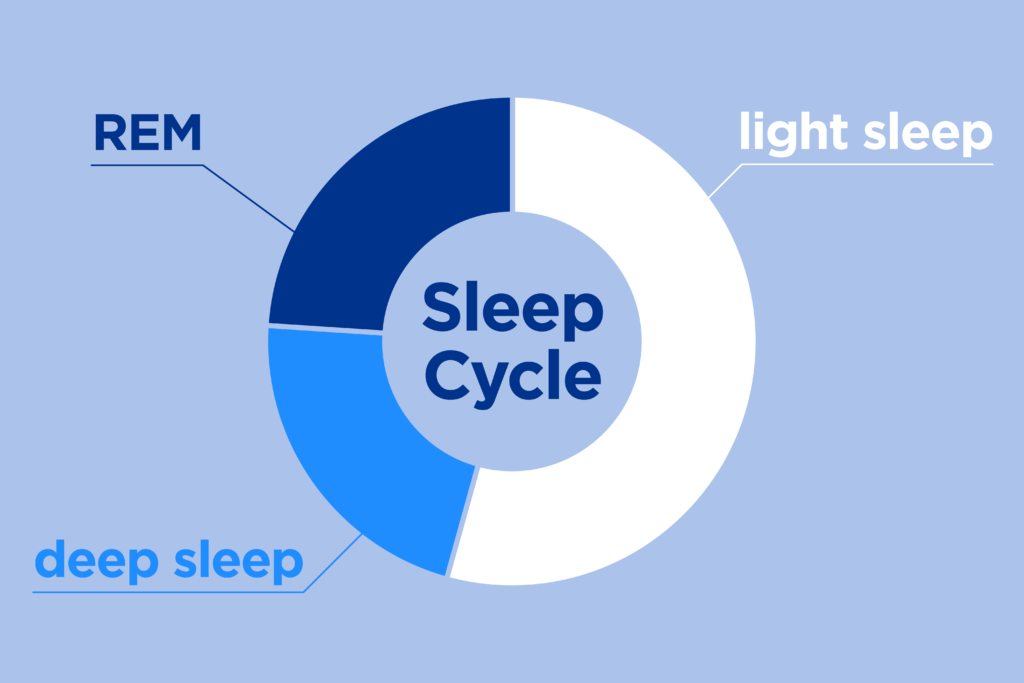
If you feel you may have a sleep disorder, talk to your doctor about your symptoms.
Tips for Better Sleep
“To ensure a good night’s rest, it’s important to establish a pattern or routine that the body can learn to anticipate,” says Dr. Lisa Ballehr.
Dr. Nikola Djordjevic, MD, also adds, “There are numerous ways in which you can improve your sleeping routine, including fixing the bedtime to a specific hour, getting some daily exercise, and avoiding foods that are difficult to digest at least 3 hours before bedtime.”
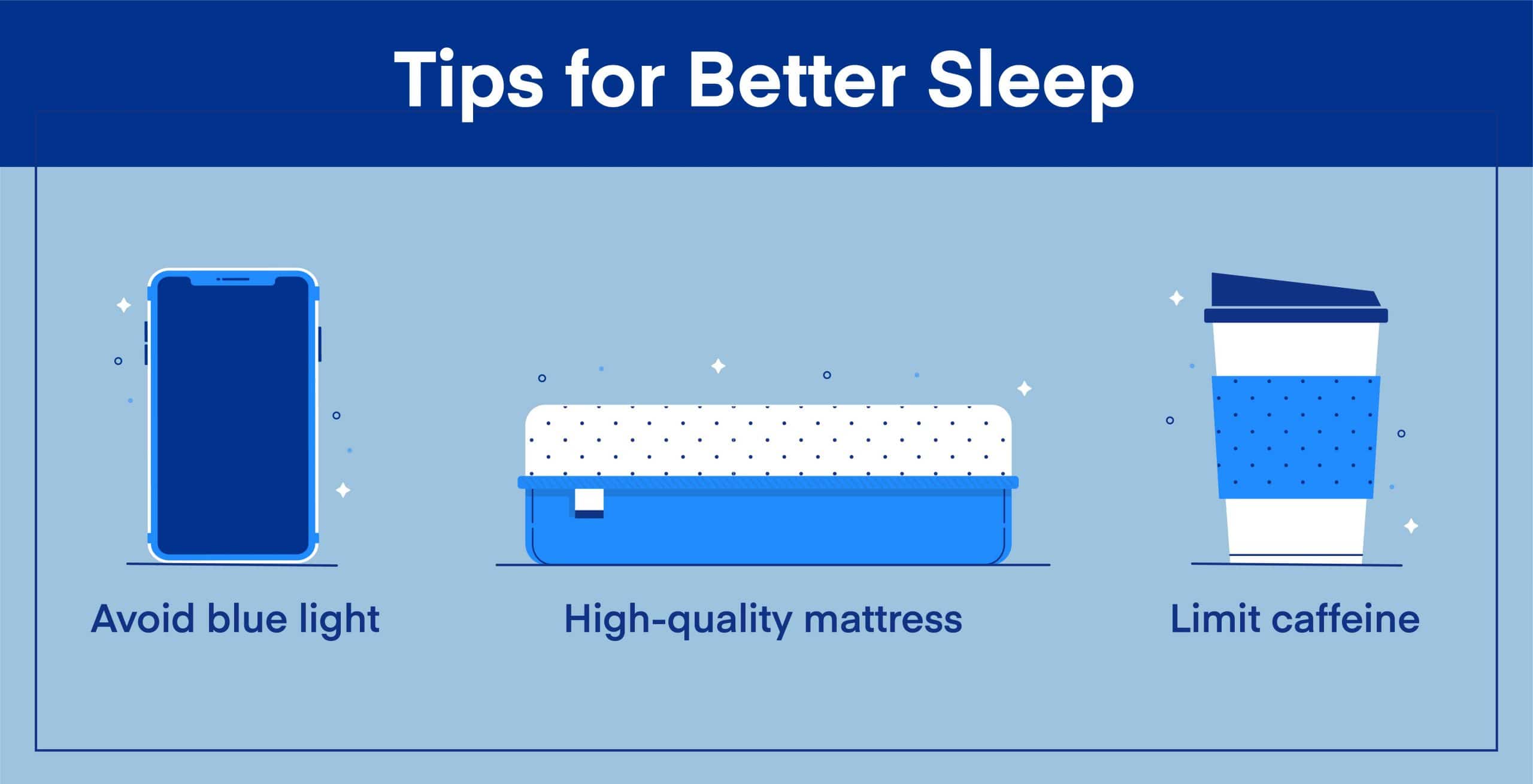
Before opting for melatonin supplements or over-the-counter medications to ease sleep troubles, consider some of our better sleep tips below:
- Go to bed and wake up at the same time each day. Doing so reinforces your natural sleep-wake cycle and gets your body in a routine.
- Avoid blue light leading up to bedtime. Blue light hinders melatonin (the sleep hormone) production, making it harder to fall asleep and stay asleep.
- Limit caffeine consumption after noon. Dr. Sarah Mitchell warns, “Consider ‘sleep stealers’ such as caffeine that can interfere with your body’s natural ‘sleep drive.’ These substances can block your body’s ability to build up a sleep pressure that tells your brain when it’s time to sleep. This can manifest as a decreased ability to fall asleep, but also stay asleep after midnight.”
- Practice a bedtime routine. Prep your body for sleep each night by doing some relaxing activities to wind down before bed—you can take a warm shower, read a book, or do some gentle stretches.
- Sleep on a high-quality mattress. A lumpy or unsupportive mattress can prevent you from achieving deep, peaceful sleep. Upgrade to the best mattress for your sleep needs so you can get comfortable sleep and wake up pain-free.
“The amount of time you sleep is very important, however uninterrupted, good quality of sleep is equally vital for an optimally healthy lifestyle, behavioral and cognitive functioning.”
Dr. Dagmara Dimitriou, Professor of Sleep Education and Research
Ready to Fix Your Sleep Schedule?
To maintain good health, you need to get adequate sleep—and if you’re like many Americans, you’re probably not getting the appropriate amount of rest each night. While sleep may seem like something we can push off to make time for other things, going without it can have a long-term impact on your health. When developing a sleep schedule, consider your age, your immediate sleep environment, lifestyle habits, and any medical conditions to determine how many hours of sleep you should get each night.
About the author
Rosie Osmun, a Certified Sleep Science Coach, brings a wealth of knowledge and expertise to the health and wellness industry. With a degree in Political Science and Government from Arizona State University College of Liberal Arts and Sciences, Rosie's academic achievements provide a solid foundation for her work in sleep and wellness. With over 13 years of experience in the beauty, health, sleep, and wellness industries, Rosie has developed a comprehensive understanding of the science of sleep and its influence on overall health and wellbeing. Her commitment to enhancing sleep quality is reflected in her practical, evidence-based advice and tips. As a regular contributor to the Amerisleep blog, Rosie specializes in reducing back pain while sleeping, optimizing dinners for better sleep, and improving productivity in the mornings. Her articles showcase her fascination with the science of sleep and her dedication to researching and writing about beds. Rosie's contributions to a variety of publications, including Forbes, Bustle, and Healthline, as well as her regular contributions to the Amerisleep blog, underscore her authority in her field. These platforms, recognizing her expertise, rely on her to provide accurate and pertinent information to their readers. Additionally, Rosie's work has been featured in reputable publications like Byrdie, Lifehacker, Men's Journal, EatingWell, and Medical Daily, further solidifying her expertise in the field.
View all posts